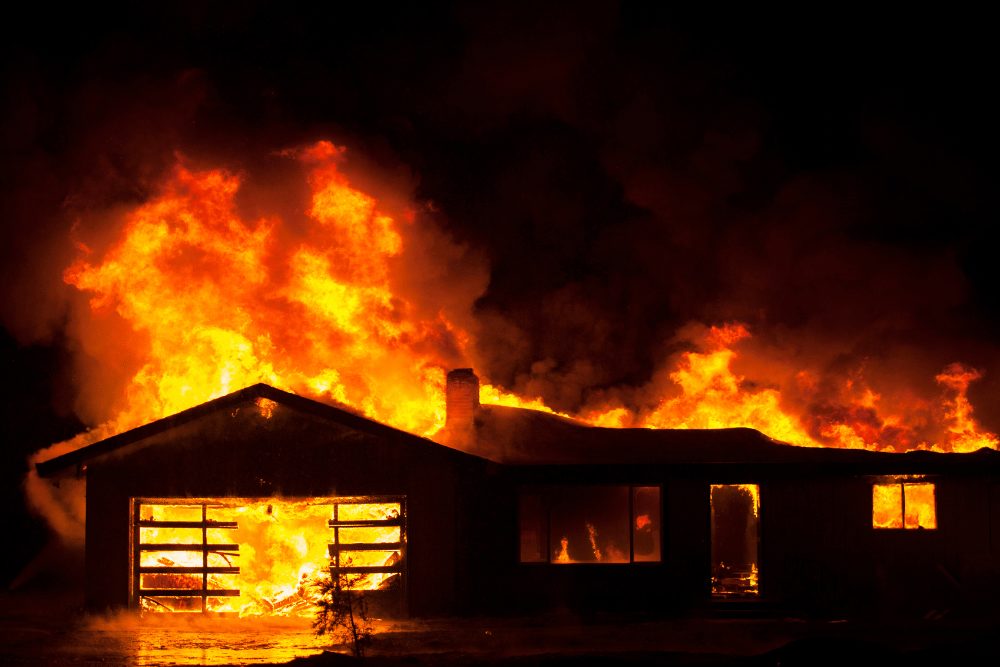Basic Fire Safety Tips for Homeowners

Many people think a fire could never happen to them, but the numbers don’t lie. In the United States, fire departments respond to nearly 350,000 house fires per year. Fires can cause immense physical, monetary, and psychological damage. Keep yourself and your family safe by following these fire safety tips.
Basic Fire Safety Tips for Your Home
There are three major components to fire safety: prevention, limitation, and response. First, try to prevent fires. If that doesn’t work, limit how much the flames can spread. Finally, know what to do in case of a fire.
These tips cover a bit of all three components.
Smoke Alarms
The simplest fire safety tip is to catch a fire before it gets started. And there is no better way than to install and maintain smoke alarms on each level of your home.
Smoke alarms became widely available and affordable during the 1970s. Since then, deaths and serious injuries from fires have reduced dramatically. In fact, the risk of dying in a house fire is 55% lower in a home with a functioning smoke detector. As a result, they’re now required by law.
That said, not everyone is conscientious about maintaining their smoke alarms. According to the National Fire Protection Association, three out of five deadly home fires happen in properties without functional smoke alarms.
Change the batteries in your smoke detectors every six months. If that’s hard to remember, set a calendar reminder or put in fresh batteries when you reset clocks for Daylight Saving Time. Dealing with smoke detector false alarms when you burn dinner may be annoying, but don’t disable your alarms. And occasionally give your detectors a gentle cleaning to clear out debris.
Fire Extinguishers
The Red Cross reports that the kitchen is the most likely room for a fire to start. Typically, this is either from a flammable item like a towel touching a burner or from a grease fire getting out of control.
The moral of the story? The best place to have a fire extinguisher is in the kitchen. You should be able to get to it easily from the stove area. Tell everyone in the house where the extinguisher is and the basics of using it:
- Pull the pin
- Aim at the base of the fire
- Squeeze the handle
- Sweep from side to side until the fire is out
And replace the extinguisher once it’s past its prime. Most are only good for about 10 years.
A bonus fire safety tip? Never throw water on a grease fire. Stick to using an extinguisher, dousing the fire with baking soda, or smothering the fire to cut off oxygen.
Cable Care
Frayed cables can cause fires. Taking care of your cables and wires can eliminate fire risks.
When unplugging wires, pull from the plug, not the cord. Over time, pulling the cord will cause damage, which can result in sparking. Also, be sure to avoid connecting too many cords into one socket. This could overload the circuit and create a fire hazard.
Emergency Exits
During a fire, your usual exits might be too dangerous to use. One of the biggest dangers in a major fire is a backdraft, where fire suddenly rushes into a room that has more oxygen. This is why firefighters will tell you to check doors for heat before you open them.
If your exit is compromised, find another way out of the house. This could be a window (preferably on the ground floor) or a door to another room, depending on your home layout. Consider investing in escape ladders for second-level bedrooms. Also, check that your windows open easily, any security bars are removable, and screens come out quickly.
A little forethought can go a long way here. Plan emergency exits and alternatives for each area of the house before you have to use them. Make sure everyone in the family feels comfortable with these plans.
Stop, Drop, and Roll
There’s a good reason we teach kids to “stop, drop, and roll” early and often. It’s a cliche because it works.
If your clothes catch fire, remember the best thing you can do is smother the blaze. Cover your face with your hands, drop to the ground, and roll from side to side until the fire is out.
Fire Safety Tips that Firefighters Want You to Know
In the event of a major fire, it will be up to the fire department and first responders to get you out of a dangerous situation. Make their job as easy as possible. After all, your life might depend on it.
Never go back into a dangerous situation to protect your valuables. Nothing you own is as valuable as your life. Make a digital backup of important paperwork now so you don’t have to risk life and limb for the hard copies.
In addition, remember that firefighters are there to help you, not judge you. Sometimes people in stressful situations, especially children, will attempt to hide for fear they’ll be blamed for the fire. It’s important to get past this feeling because working with firefighters can mitigate the damage.
Tell firefighters about any pets immediately. They know your animals are important to you, and they’ll do everything they can to help, but they won’t let you charge back into a blaze.
Finally, teach children age-appropriate fire safety tips. Start by emphasizing that fire is a tool, not a toy. Supervise them around open flames. When they’re old enough, practice lighting fireplaces, campfires, candles, or stoves together. And tell them what they should do if a fire gets bigger than expected.
Other Common Fire Hazards
While most fires start in the kitchen, there are other hazards you should try to eliminate.
- Water plants, especially Christmas trees, regularly so that they don’t dry out.
- Be careful not to overload circuits.
- Repair or replace damaged electrical items.
- Don’t leave a heating apparatus unattended.
- Keep candles and heaters away from curtains and other flammable materials.
- Only use heaters that will shut off automatically if they’re tipped over or left on too long.
- Never use a portable generator indoors.
- Smokers should use an ashtray or other fireproof container, preferably outside.
Remember, your priority is to prevent a fire. Prevention is always better than reaction.
Prioritize Whole-Home Safety with Deep Sentinel
A fire can be a scary thing, but with preparation, you can lessen the negative impact it could have on your life. Every factor that you can control in the equation of home safety is a victory.
At Deep Sentinel, we care about you, your family, and your property. That’s why we offer the leading security products on the market. For other safety and security, check out the Deep Sentinel blog. And to experience our revolutionary live security monitoring solution, call 833.983.6006.
Need a Solution that Prevents Crime?
Deep Sentinel is the only security technology that delivers the experience of a personal guard on every customer’s home and business. Call 833.983.6006 for your free security consultation.

